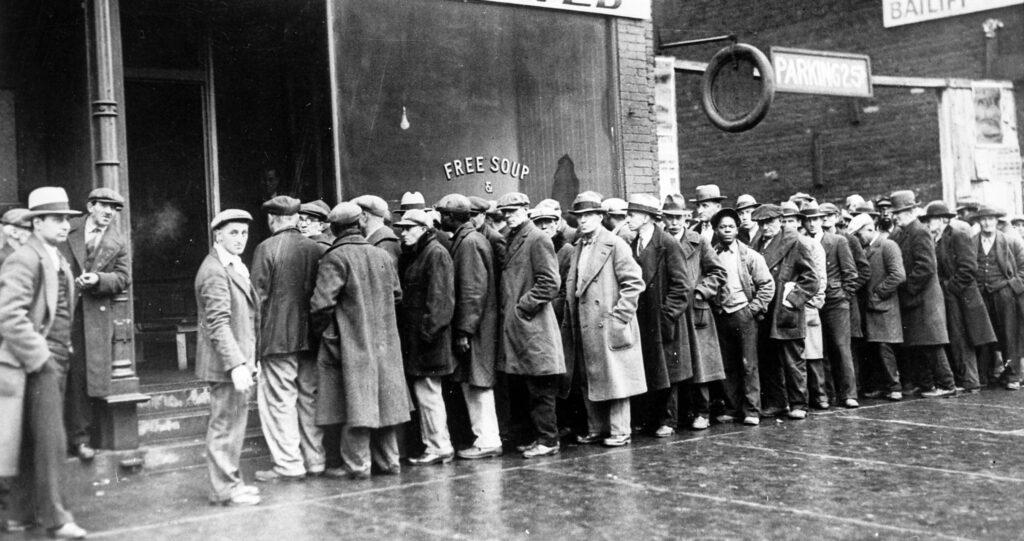
Take a look at our newest merchandise
The Nice Melancholy modified America in ways in which went far past financial institution failures and bread strains. It reshaped how generations of households considered cash, abandoning classes of frugality, warning, and resourcefulness that also echo in our monetary habits as we speak. Saving for a wet day, avoiding debt, and stretching each greenback weren’t simply beliefs—they turned survival methods that carried ahead lengthy after the financial system recovered.
The Melancholy additionally left its mark on the bodily panorama. Huge infrastructure tasks put folks again to work and constructed the roads, bridges, and parks that made cross-country journey and ultimately America’s freeway system potential. In a method, the identical period that taught Individuals to be thrifty additionally gave them the instruments to discover, join, and transfer extra freely throughout the nation.
Let’s take a better take a look at how this seismic occasion formed our relationship with cash. From cautious investing to the drive for homeownership, listed below are 12 monetary mindsets born out of the Nice Melancholy that also affect us as we speak.
1. Frugality Turned a Advantage
-

Photograph Credit score: Carl Mydans – Public Area/Wiki Commons.
Through the Nice Melancholy, each greenback needed to stretch so far as potential. Folks realized to repair as a substitute of change, reuse gadgets, and make do with what they’d.
This mindset persevered for many years, shaping the monetary habits of future generations. Even as we speak, the concept of residing under your means is widely known as a cornerstone of financial success.
2. Financial savings Took Middle Stage
-


Photograph Credit score: Unknown writer – Public Area/Wiki Commons.
The financial instability of the Thirties taught folks the significance of getting a monetary security internet. Many Melancholy-era households hoarded money, cautious of banks failing once more.
Whereas youthful generations might not stash payments below their mattresses, the worth of an emergency fund stays a key monetary precept.
3. Mistrust of Banks
-


Photograph Credit score: Nationwide Archives Photograph, Social Safety Historical past Web site – Public Area/Wiki Commons.
When banks failed through the Nice Melancholy, hundreds of thousands of individuals misplaced their life financial savings. This traumatic expertise led to widespread mistrust in monetary establishments.
This skepticism lingered, influencing all the pieces from financial institution rules to private monetary administration. For some, the concern of shedding all of it has by no means fully pale.
4. Avoiding Debt Turned a Precedence
-


Photograph Credit score: Nationwide Archives – Public Area/Wiki Commons.
Debt was a luxurious most couldn’t afford through the Nice Melancholy. Borrowing cash turned synonymous with danger, and plenty of vowed by no means to depend on credit score.
Though bank cards and loans are extra widespread as we speak, the anxiousness surrounding debt nonetheless resonates, notably amongst older generations.
5. Homeownership Turned the American Dream
-


Photograph Credit score: Hmalcolm03 – CC BY-SA 4.0/Wiki Commons.
The steadiness of proudly owning a house turned a beacon of hope after the chaos of the Nice Melancholy. It symbolized safety, independence, and a buffer in opposition to future financial crises.
This dream persists, although the monetary realities of reaching it have modified drastically in latest a long time.
6. The Rise of DIY Tradition
-


Photograph Credit score: Franklin D. Roosevelt Presidential Library and Museum – Public Area/Wiki Commons.
Through the Melancholy, folks couldn’t afford to rent assist, so that they realized to do issues themselves, from residence repairs to stitching their very own garments.
This do-it-yourself angle turned a trademark of resilience, inspiring generations to worth self-sufficiency over comfort and lower your expenses within the course of.
7. Significance of Group Help
-


Photograph Credit score: Unknown writer – Public Area/Wiki Commons.
The Nice Melancholy introduced communities collectively, as neighbors relied on each other for meals, childcare, and even emotional help.
This collective mindset strengthened the concept that surviving robust occasions requires collaboration, a sentiment that echoes in community-driven monetary options as we speak.
8. The Worry of Financial Collapse
-


Photograph Credit score: Mark Benedict Barry – CC0/Wiki Commons.
The trauma of widespread unemployment and monetary damage left an enduring concern of extended financial instability.
Even a long time later, financial downturns set off an virtually instinctive response to chop spending and enhance financial savings.
9. A Cultural Shift Towards Insurance coverage
-


Photograph Credit score: Unknown writer or not supplied (U.S. Nationwide Archives and Information Administration) -Public Area/Wiki Commons.
The Nice Melancholy highlighted how unprepared most individuals had been for emergencies, resulting in an increase in life, well being, and residential insurance coverage insurance policies.
This give attention to “just-in-case” planning continues to drive monetary choices, from creating wills to diversifying earnings streams.
10. Skepticism Towards Hypothesis
-


Photograph Credit score: Related Press – Public Area/Wiki Commons.
The inventory market crash of 1929 taught folks to be cautious of get-rich-quick schemes and speculative investments.
This cautionary story has influenced fashionable approaches to investing, favoring diversification and long-term development over dangerous ventures.
11. Emphasis on Training
-


Photograph Credit score: Unknown writer or not supplied (U.S. Nationwide Archives and Information Administration) -Public Area/Wiki Commons
Many considered training as a pathway out of poverty through the Nice Melancholy, prioritizing studying as a way to realize upward monetary mobility.
This perception in training’s transformative energy persists, driving households to spend money on education even in robust financial occasions.
12. Saving for Retirement
-


Photograph Credit score: Nationwide Archives at School Park – Public area/ Wiki Commons
The hardships of the Nice Melancholy uncovered how unprepared most individuals had been for monetary downturns later in life. In response, retirement safety turned a nationwide precedence, resulting in the creation of Social Safety in 1935 and inspiring many corporations to supply pensions as a strategy to shield employees’ futures.
Over time, conventional pensions have largely disappeared, changed by 401(ok)s and particular person financial savings accounts. Nevertheless, the Melancholy-era lesson that it is advisable to plan for the later chapters of life nonetheless drives the emphasis on retirement saving as we speak.







